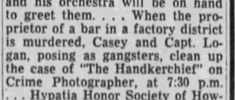Cole plants a part of the story at the beginning -- Lt. McCue's preference for cigars -- which sets up the light-hearted closing scene. It does not affect the solution of the crime, but its use at the end of the broadcast gives some insight into Logan. He will not explain that the gift of cigars is because he was embarrassed (or too polite) to admit that during the story he considered whether Lt. McCue was a corrupt cop and possibly a murder suspect. If you remember the comment at the beginning of the episode, then the close is more rewarding. (We're OTR collectors... we listen to the same episodes again and again, so there's no need for spoiler alerts.)
ADC's continutity document...
Joe Poletti, owner of a tavern has $20,000 upstairs in his safe with which to cash checks for the factory workers. When he is robbed and killed, his two bartenders are downstairs, and a third bartender, Gus, has not yet arrived for work. Chief suspect is Snyder because the handkerchief was found in the room with the body. He was in the tavern before the murder griping because he couldn't get a job bartending, as he had previously been employed by Poletti and was fired for stealing. A policeman named McCue is also under suspciion because he needs money to take care of his sick wife. Snyder, when arrested, confesses but won't talk further until he has seen his lawyer. He has a perfect alibi when Poletti was shot, but made a phoney confession to give the killer plenty of time to get the stolen money under cover. So Snyder and the killer were working together. Casey and Logan decide to trail Snyder. He evades the detectives assigned to follow him and is found dead on a country road. Since Gus, the bartender, was the only person who communicated with Snyder, Casey and Logan question him and trick him into confessing the murders.
You'd think $20,000 is not a big amount of money. But August 1946's $20,000 is more than $254,000 in today's money. That must have been some factory to have a weekly payroll that big! By my back-of-the-envelope calculation from Census data the annual sales of the goods from that factory would have been about $31 million with 400 employees... and that's only if the bar cashed EVERY SINGLE CHECK OF EVERY SINGLE WORKER. It is very odd to have that much money in a safe in a retail establishment nowadays no matter the reason. Obviously, Cole wanted an amount worth committing murder for, but this is outlandishly high... and Cole may have wanted a near-gasp from the listener.
Many of the stories we listen to would have one of their plot elements eliminated by technology. The barkeeper would have no need to have cash on hand like this today because of direct deposit electronic funds transfer technologies. Nor would the barkeeper be able to use check cashing as a draw for foot traffic into his bar. Many scenes in Casey stories hinge on not being able to reach someone by telephone because they're not home or in their office, which would be eliminated by the use of mobile phones. Heck... for some newspapers, the use of smartphone cameras by reporters has eliminated the position of staff photographer! Writers would figure out some other anchor event for their story to work today.
Cole often has characters leaving the Blue Note with Ethelbert saying goodbye to them. This episode it's "Mrs. Wheelbracker" (16:20 mark). I don't have any resources that explain where Cole gets these names either out of thin air, street names, acquaintances, co-workers, classmates, random names from a phonebook, whatever, like most authors do. For some authors, like Bill Robson, it tends to be more obvious. But Cole is a mystery.
Bar employee Walter mentioned is mentioned at 17:20. Walter is a regular character who usually works in the basement but almost never has a line of dialogue. He's often asked to retrieve something and bring it up to the bar. Grace, the waitress, is another regular who often has no lines in the story. When she does, the dialogue is brief and sometimes implies an ongoing relationship or a flirtatious one with Ethelbert.
The bartender in the opening scene has the last name “Poletti.” That's funny: the cop in the first scene of Red Raincoat is named “Poletti.”
This is a good entry in the series. Back in the reel era, this was not a commonly traded episode since it was on a mixed reel with other programs. It tended to be hard to find.
Casey 46-09-05 149 The Handkerchief.mp3
Degoo https://cloud.degoo.com/e/drive-pppwbxpvjnkt
hubiC http://ovh.to/q6GfeQr
1946-09-05 Birmingham AL News
1946-09-05 Mason City IA Globe-Gazette

